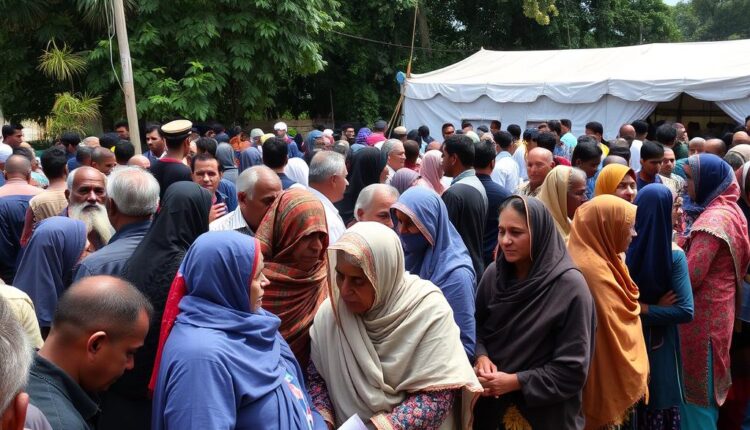The Hidden Exploitation in Free Medical Camps
Peerzada Mohsin Shafi
In the past, medical camps were organized by charitable organizations, hospitals and healthcare workers with the sole aim of serving the community. These camps were a lifeline for those in rural or underserved areas offering basic healthcare, free tests and treatments to individuals who otherwise might not have access to medical care. The purpose was clear to provide support to the underprivileged and improve overall health outcomes. Unfortunately, the landscape has shifted. While many free medical camps still exist with genuine intentions, an increasing number are turning into commercial ventures, with profit-driven motives that often leave patients vulnerable.
Today, it is not uncommon to scroll through social media and see posts about free heart checkups, eye exams and even free medications and tests. The word “free” is a powerful marketing tool and it entices a large number of people to attend these camps. After all, who wouldn’t want to benefit from a free medical service, especially if it promises to identify health issues early or provide solutions to existing problems?
“What begins as a free consultation too often ends with patients being pushed into costly and unnecessary treatments.”
However, there is an emerging pattern in which the real goal of these camps seems to be something other than healthcare. While the camps may offer initial free services, such as tests or consultations, there is often a hidden agenda behind these offers. The unfortunate truth is that many of these camps are primarily designed to hook patients into paying for additional services that may or may not be necessary. What begins as a free consultation or test often ends with the patient being advised to undergo expensive follow-up treatments or surgeries, some of which could be entirely unnecessary.
Recently an eye checkup camp organized in Anantnag by a reputed eye hospital in the region. The camp which was advertised as a free service, attracted a large number of people looking for routine eye exams. However, nearly 80% of the individuals who attended the camp were told by the doctors that they needed immediate surgery. The patients were then advised to travel to the capital city with their “golden cards” for further treatment. Many of these patients were shocked to learn that surgery was deemed necessary, especially since they had simply come for a routine checkup. Concerned, some individuals sought a second opinion from another ophthalmologist. To their surprise, the second doctor confirmed that their eyes were perfectly healthy and that surgery was not required. This revelation caused significant distress for many who had initially believed they were receiving genuine medical advice.
“At one free eye camp, nearly 80% of attendees were told they needed immediate surgery—yet many later discovered their eyes were perfectly healthy.”
This incident is just one example of how free medical camps are being used as a tool to lure in patients for follow-up treatments that may not be needed. While the camps may provide free tests or initial consultations, the real purpose often becomes clear when patients are encouraged to seek expensive procedures or treatments elsewhere. These follow-ups are where the real money lies, and unfortunately, many patients, especially the elderly or those with limited healthcare knowledge, are easily manipulated into accepting unnecessary treatments.
The concerning trend does not stop at eye checkups. Similar issues have been observed in other types of medical camps as well. From free heart checkups to free diabetes tests, many camps use these offers to attract large numbers of people. Once patients are in the door, the strategy often shifts to pushing them into follow-up appointments or recommending costly treatments. The use of government health cards, such as PMJAY cards, further complicates matters. While these cards are intended to provide insurance to the poor, some unscrupulous camps exploit them to gain access to government funding, creating a cycle of unnecessary treatments and billing.
Sadly, these practices continue largely unchecked. Despite numerous reports and instances of exploitation, there is little oversight or action from local authorities to regulate these camps. In many cases, the administration remains silent or fails to take adequate measures to address the situation. This lack of accountability only fuels the problem, allowing these fraudulent practices to persist and spread.
The question that arises is why there is such a blatant disregard for the well-being of the people attending these camps. In many cases, individuals are simply looking for a way to improve their health and reduce medical costs. They trust that a free medical camp will provide legitimate help. However, they are often met with unnecessary procedures and treatments designed to generate profit, not care. What starts as a noble idea of offering free healthcare becomes a trap for vulnerable individuals.
“The real money lies not in the free checkups, but in the follow-up treatments that vulnerable patients are persuaded to undergo.”
The solution lies in greater transparency and regulation. Authorities must step in to ensure that free medical camps are genuinely serving the community’s best interests, rather than exploiting their need for healthcare. These camps should be thoroughly monitored, with strict guidelines about what treatments and procedures can be offered. Additionally, patients must be educated about the potential risks of accepting treatments at these camps without seeking second opinions from trusted medical professionals.
It’s essential that as a society, we don’t fall prey to the allure of “free” without understanding the consequences. Free healthcare services should remain focused on serving those who need them most, not on generating profit from vulnerable populations. The ultimate goal should always be to provide care that improves health outcomes, not to manipulate individuals into unnecessary and costly treatments. Until the administration takes a stronger stand, however, the exploitation under the guise of charity will likely continue
Author Peerzada Mohsin Shafi hails from Anantnag and is construction project planning and contracts expert.


Comments are closed.